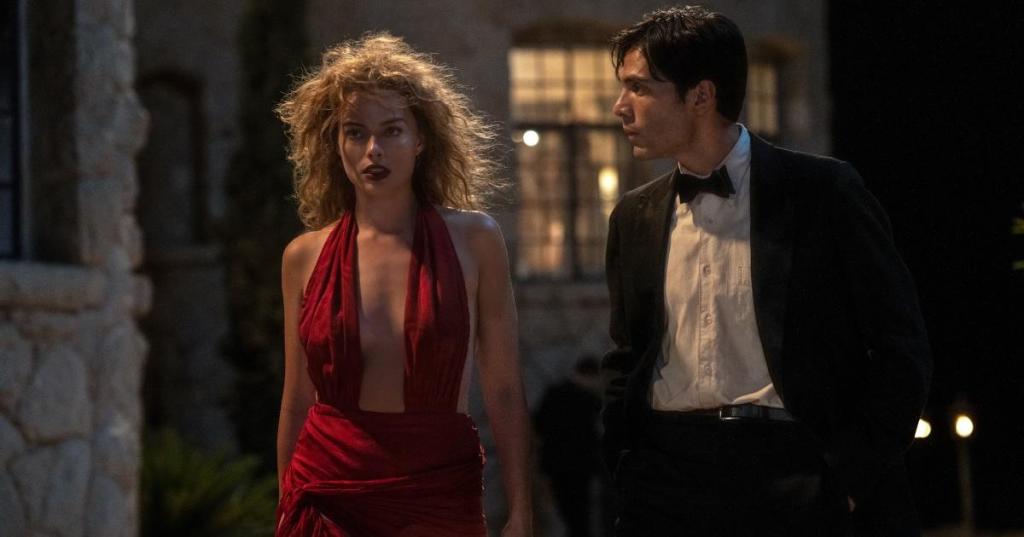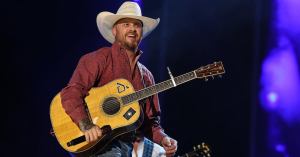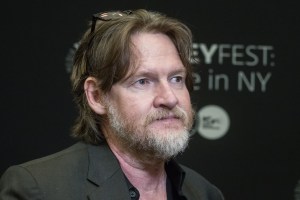Babylon is director Damien Chazelle’s latest ambitious film, a three-hour monumental epic tracking the transition from silent movies to talkies in the late 1920s. It is told through the eyes of Diego Calva’s Manny Torres, a Mexican immigrant who climbs the ranks of Hollywood from stagehand to executive, and Margot Robbie’s Nellie LaRoy, a New Jersey native convinced she has the talent to be a star. Their stories are brought to life by the pulsing, percussive, and bawdy Oscar-nominated score by Justin Hurwitz, who sat with PopCulture.com to break down the making of this unforgettable music.
Since Babylon was first screened last fall, Hurwtiz’s score was singled out as one of the best aspects of the film. It features distinct themes for the main characters, including a love theme that reflects the friendship and blossoming romance between Nellie and Manny. And since no Chazelle movie (save for First Man) is complete without a story involving a musician, Hurwitz had a chance to spotlight the power of trumpets through Jovan Adepo’s Sidney Palmer character.
Videos by PopCulture.com
Hurwitz won two Oscars for his work on Chazelle’s La La Land and picked up a Golden Globe in January for Babylon. He is nominated for Best Original Score at the Oscars for Babylon, which is also up for Best Costume Design and Best Production Design. Before the Oscars on March 12 and Babylon‘s home video release on March 21, Hurwitz walked us through the process and his inspirations for the score.
First off, congratulations on the new Oscar nomination. This time you get to compete against The Fabelmans composer John Williams.
Justin Hurwitz: I know, that’s pretty surreal. I’m excited just to spend some time with John. There are some nominee events and so I get to, I think he’ll probably be at, there’s a thing this coming week and I think in a few weeks after that. I had never met him until the Golden Globes. I’d, of course, wanted to meet him my whole life… and certainly, since I started to think about being a composer.
I didn’t know he was going to be at the Golden Globes, I thought maybe he wouldn’t come. Then when [director Steven] Spielberg was giving his speech at the very end of the night, it was the last speech of the show and he said he thanked Johnny Williams and he pointed to the corner. I was like, “He’s here? He’s here?” As soon as that speech ended, I sprinted across the room and I met him because I’d been wanting to meet him for a while.
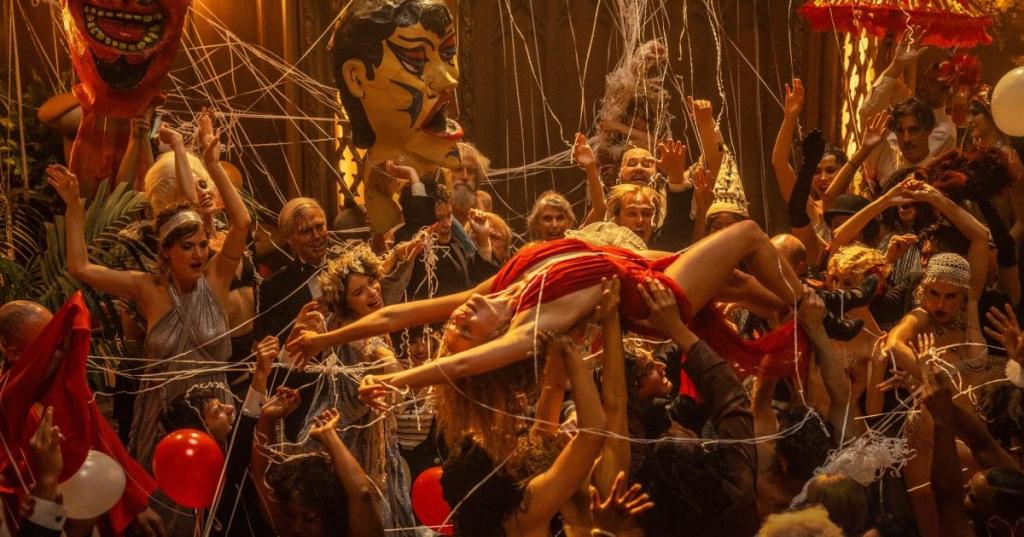
What does it mean for you to be in that company, to know that you’re in that field with him? The Banshees of Inisherin composer Carter Burwell is nominated this year, too. It’s a really strong field this year.
It’s incredible, obviously, to be in a category with John Williams and Carter as well. Carter is somebody who I really started looking up to in college. Damian and I, when we were in college, would talk about Carter a lot because he was approaching his scores in a very, he has more of very committed to a couple of filmmakers, [including] the Coen Brothers. He’d been doing the Coen Brothers movies for a while. He has just always seemed to have a little bit more of a boutique approach to the way he composed the scores. They felt very handmade and very personal and he was definitely a real inspiration as somebody we talked about back in college.
Your score for Babylon is so integral to the movie. How early in the process did Damien come to you and say, “Hey, I’m doing this new movie about Hollywood and we got to do this big score for it?”
He told me about it. I first learned about the project as he was writing it. At the end of 2018, he told me what he was working on and that was the first I heard of it. Then, about a little less than a year later, in the fall of ’19, he had a draft. When I got the draft and read it, I was just so entertained. It was such a ridiculously entertaining script, full of set pieces and gags and so much stuff and great monologues and just such soliloquies or whatever, such a great read.
Then we dove in immediately. So, [I] started marking up the scripts, talking about where there would be music, where there wouldn’t, the architecture of the whole score really. There was a lot that we didn’t know and couldn’t figure out until post-production, about an hour of the two hours of music we kind of saved until I could watch the movie and watch the scenes. But for a lot of it, we could build things and sort of come up with the architecture even from that script stage.
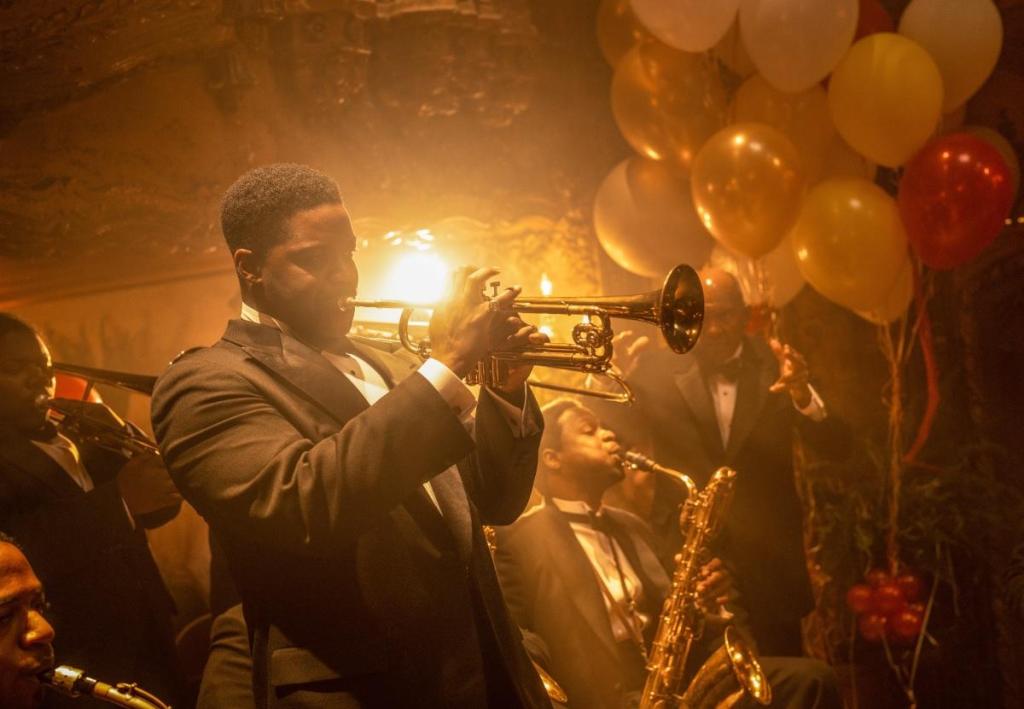
One of my favorite stories in the movie is Sidney Palmer’s story, and Jovan Adepo really just brings that trumpet to life. Did you have to work extensively with him to make sure your visions for this character’s music were going to come to life?
Yeah. I had been demoing, Damien and I together had been building up these music demos and we had a week in the studio to actually record all these trumpet solos and things and then sent it all off to Jovan. He had a trumpet teacher, Dan Fornero, who’s one of the top session players in town. So, Jovan worked with Dan for a bunch of months, just learning it, and learning the fingering and getting it all right.
For a music movie, when we have music in the scenes like in Whiplash, La La Land, or Babylon, I do come to set and I am there to just watch the monitors and police the fingering and all that, not just for the lead character like Ryan Gosling in La La Land, Jovan here, but all the musicians. [For] Jovan, there was nothing to fix, like he had learned those parts so perfectly.
I was very often catching things and going and talking to the rest of the band about things, “You should be resting here. I saw you were playing during the rest.” They were, for the most part, very good too. But Jovan, there was nothing really to fix, he had learned those parts so well. And what so impressed me about them was he approached them like an actor too. So, he was both doing a musically technical thing that he had studied, but he was also really acting. You could see on his face that he would embody the Sidney character. He would add flair to the way he would sort of use his palm to squeal and his facial expressions.
Of course, there’s that one scene later where it’s a particularly emotional scene, a very powerful scene, kind of involving a solo he’s playing and being on set. That scene was intense and he really, that was really a moment in the movie. But even at that party where he’s just having fun, he’s doing it as Sidney. It was so interesting to see the music and the acting all come together.
Now, for the other characters who aren’t musicians, where do you start when it comes to creating their themes? Margot Robbie’s character and Diego Calva are two characters who also share a lot of scenes together. How do you decide which characters really get their own separate themes? How does knowing the actor that’s playing those characters influence what you would create for them?
It depends. In the case of a track like “Voodoo Mama,” which is Margot’s big dance number at that opening party, that was something we demoed early on. Before the movie was shot, we recorded it. I had been working with storyboards – Damien works in detailed storyboards and he creates animatics, an animation of his hand drawings – so I was working with those. We were building that track before we shot the movie.
For something like Manny and Nellie’s theme, their romantic theme, and their relationship theme, we knew there needed to be a Manny-Nellie theme, but it didn’t fall into place. We didn’t have it until post-production, which is fine. That’s really very often how it should be, where you can watch the movie, you can watch the scenes, you can be inspired by their acting and the pacing of their dialogue and all of that. So, that was more of a traditional film scoring approach, which is I watched their scenes and I write to that.
That being said, we went around and around and around with ideas before we had the right thing. We had the tune, we came up with the tune eventually, it’s actually a slower version of that sax dance tune that we do elsewhere… It’s basically a slowed-down and differently harmonized version of that. But the instrumentation took a long time to really come up with the right sound for them.
We went around all sorts of ideas, and where we ended up was three pianos blended together. The first piano is just a very beautiful mellow Steinway, like a baby grand mid-size piano. Not too big and majestic, but not too small, just a mid-size Steinway. A second piano is a little spinet piano that was treated with tacks in the hammers. You put tacks in the hammers and it gives it this twang. And the piano was also a bit out of tune, a little out tune.
Then the third piano was a very, very out of tune, broken, upright piano. So, you mix these three pianos and you get the beautiful Steinway and the different amounts of out-of-tune from the other two pianos. So, you have the sweet and the sour, all mixing together, and it just had this kind of fragile, broken quality that felt like what we were seeing from their performance and what we could see from their relationship. It just felt like their relationship to us. Once we had that blend of pianos and that idea, we realized, “OK, that feels like them.” But those scenes had to be cut and we had to really live with that for a little bit before that idea took shape.
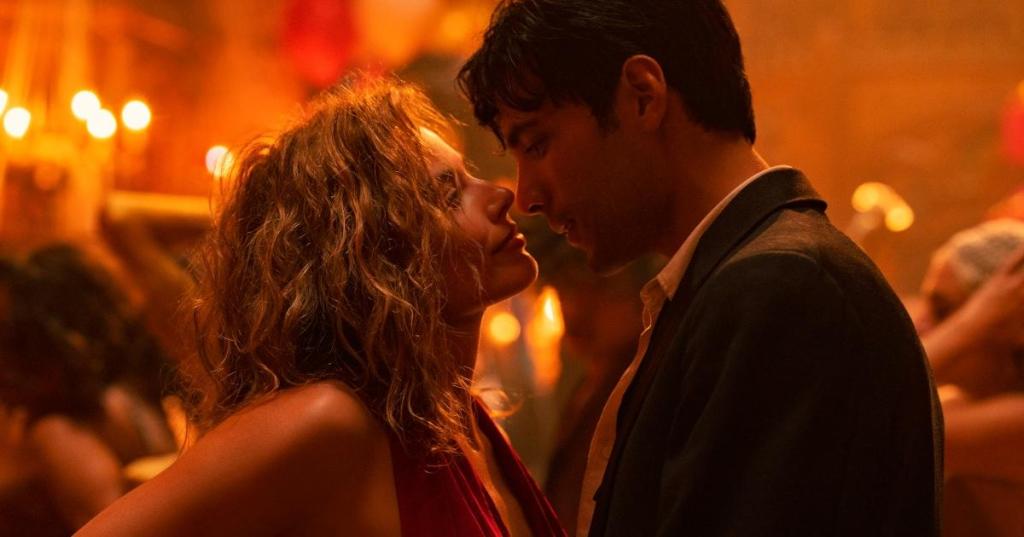
It’s really fascinating hearing how the different pianos and things come together. I’ve heard in other interviews you’ve said that you used a lot of instruments or things that would’ve been used in the 1920s. Did you research silent movie scores to figure out authentic sounds for the scenes, especially when you see them shooting in the early part of the film when they spend so much time filming a silent movie?
Yeah. I think you’re referencing some of the party music, some of the music that’s played by bands.
It’s the lineup of a ’20s band, more or less, maybe a little bigger, with two trumpets, two trombones, and some saxophone rhythm section. But we use the instruments in much more contemporary ways. The silo, the writing is a lot more rock and roll, a lot more sort of modern dance music.
When it comes to the rest of the score, no, I wasn’t listening to silent films. We really wanted to stay away from that sort of world. There are a couple of cues that are definitely homages to classical music. There’s a cue on the hilltop that’s very Wagner-inspired. So, certainly, I was, in the case of some cues drawing on inspiration elsewhere, [but] not really silent movies. The only thing that I was really trying to mimic the movie music of that era was when we do “Singin’ in the Rain: on the sound stage, and you have everybody in rain slickers and the rain is coming down, that scene is basically a recreation of [The Hollywood Revue of 1929] that introduced “Singin’ in the Rain.” That’s where that song was introduced way before the Gene Kelly version.
The clip is on YouTube. You can get the clip, you can hear it. It’s a very crunchy old recording. I was listening to that recording, trying to hear and trying to interpolate what is going on, what are the trumpets doing, what’s the piano doing? I was trying to listen and get as close as I could. Like I said, it’s so crunchy that I had to sort of imagine what a lot of the harmonies and the instruments are doing. But I was trying to recreate that piece of music. That’s the closest thing I did to really trying to study up on something and then mimic it when it comes to the film music of the era.

